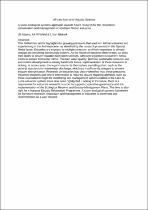 ResearchSpace
ResearchSpace
A socio-ecological systems approach towards future research for the restoration, conservation and management of southern African estuaries
JavaScript is disabled for your browser. Some features of this site may not work without it.
- ResearchSpace
- →
- Research Publications/Outputs
- →
- Journal Articles
- →
- View Item
| dc.contributor.author |
Adams, JB

|
|
| dc.contributor.author |
Whitfield, AK

|
|
| dc.contributor.author |
Van Niekerk, Lara

|
|
| dc.date.accessioned | 2020-10-08T09:03:14Z | |
| dc.date.available | 2020-10-08T09:03:14Z | |
| dc.date.issued | 2020-04 | |
| dc.identifier.citation | Adams, J.B., Whitfield, A.K. and Van Niekerk, L. 2020. A socio-ecological systems approach towards future research for the restoration, conservation and management of southern African estuaries. African Journal of Aquatic Science, v45(1-2), pp 231-241. | en_US |
| dc.identifier.issn | 1608-5914 | |
| dc.identifier.issn | 1727-9364 | |
| dc.identifier.uri | https://doi.org/10.2989/16085914.2020.1751980 | |
| dc.identifier.uri | https://www.tandfonline.com/doi/abs/10.2989/16085914.2020.1751980 | |
| dc.identifier.uri | http://hdl.handle.net/10204/11605 | |
| dc.description | Copyright © NISC (Pty) Ltd. This is the abstract version of the work. For access to the fulltext, please visit the publisher's website. | en_US |
| dc.description.abstract | This Reflections article highlights the growing pressures that southern African estuaries are experiencing in the Anthropocene, as identified by the research presented in this Special Medal Issue. Estuaries are exposed to multiple stressors, and their responses to climate change are becoming increasingly evident. As the health of estuaries deteriorates, so does their ability to deliver valuable ecosystem services. Although legislation in southern Africa exists to ensure freshwater inflow, maintain water quality, promote sustainable resource use and control development in estuary functional zones, implementation of these measures is lacking. In some cases, the legal instruments themselves are falling short, such as the general standards for wastewater discharge, which are insufficiently stringent to prevent estuary eutrophication. Research on estuaries has clearly identified how these pressures influence estuaries and where intervention is required. Issues requiring attention, such as those elucidated through the monitoring and management options related to the Lake St Lucia estuarine system, have also been highlighted. Looking to the future, there is a requirement for estuarine research, in order to support cooperative governance and the implementation of the Ecological Reserve and Estuary Management Plans. The time is also right for a National Estuary Restoration Programme. A socio-ecological systems framework for the future research, restoration and management of estuaries is presented and recommended as a way forward. | en_US |
| dc.language.iso | en | en_US |
| dc.publisher | NISC (Pty) Ltd | en_US |
| dc.relation.ispartofseries | Worklist;23815 | |
| dc.subject | Estuary management plans | en_US |
| dc.subject | Environmental legislation | en_US |
| dc.subject | Estuary health | en_US |
| dc.title | A socio-ecological systems approach towards future research for the restoration, conservation and management of southern African estuaries | en_US |
| dc.type | Article | en_US |
| dc.identifier.apacitation | Adams, J., Whitfield, A., & Van Niekerk, L. (2020). A socio-ecological systems approach towards future research for the restoration, conservation and management of southern African estuaries. http://hdl.handle.net/10204/11605 | en_ZA |
| dc.identifier.chicagocitation | Adams, JB, AK Whitfield, and Lara Van Niekerk "A socio-ecological systems approach towards future research for the restoration, conservation and management of southern African estuaries." (2020) http://hdl.handle.net/10204/11605 | en_ZA |
| dc.identifier.vancouvercitation | Adams J, Whitfield A, Van Niekerk L. A socio-ecological systems approach towards future research for the restoration, conservation and management of southern African estuaries. 2020; http://hdl.handle.net/10204/11605. | en_ZA |
| dc.identifier.ris | TY - Article AU - Adams, JB AU - Whitfield, AK AU - Van Niekerk, Lara AB - This Reflections article highlights the growing pressures that southern African estuaries are experiencing in the Anthropocene, as identified by the research presented in this Special Medal Issue. Estuaries are exposed to multiple stressors, and their responses to climate change are becoming increasingly evident. As the health of estuaries deteriorates, so does their ability to deliver valuable ecosystem services. Although legislation in southern Africa exists to ensure freshwater inflow, maintain water quality, promote sustainable resource use and control development in estuary functional zones, implementation of these measures is lacking. In some cases, the legal instruments themselves are falling short, such as the general standards for wastewater discharge, which are insufficiently stringent to prevent estuary eutrophication. Research on estuaries has clearly identified how these pressures influence estuaries and where intervention is required. Issues requiring attention, such as those elucidated through the monitoring and management options related to the Lake St Lucia estuarine system, have also been highlighted. Looking to the future, there is a requirement for estuarine research, in order to support cooperative governance and the implementation of the Ecological Reserve and Estuary Management Plans. The time is also right for a National Estuary Restoration Programme. A socio-ecological systems framework for the future research, restoration and management of estuaries is presented and recommended as a way forward. DA - 2020-04 DB - ResearchSpace DP - CSIR KW - Estuary management plans KW - Environmental legislation KW - Estuary health LK - https://researchspace.csir.co.za PY - 2020 SM - 1608-5914 SM - 1727-9364 T1 - A socio-ecological systems approach towards future research for the restoration, conservation and management of southern African estuaries TI - A socio-ecological systems approach towards future research for the restoration, conservation and management of southern African estuaries UR - http://hdl.handle.net/10204/11605 ER - | en_ZA |





